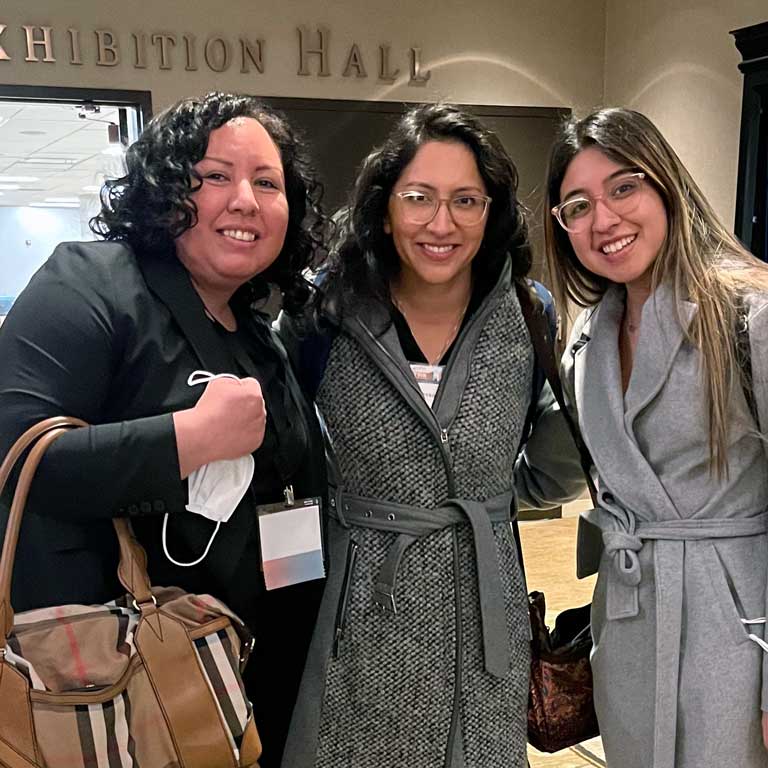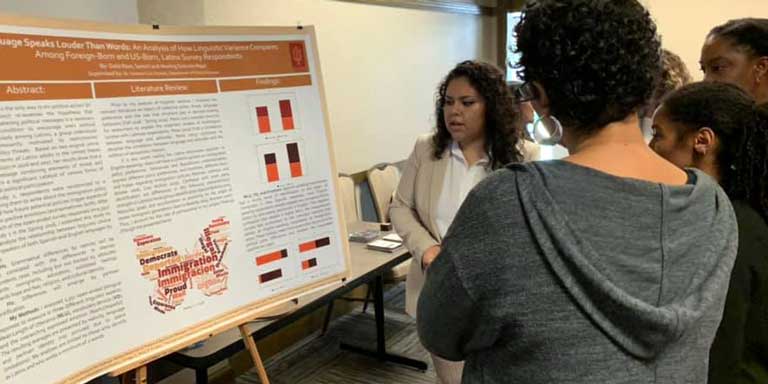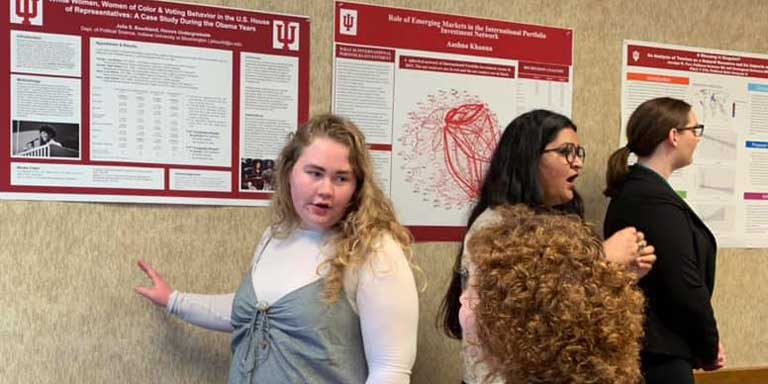“[The Ford Foundation] has individual fellowships and it’s a wonderful network of scholars that you can stay connected to from various disciplines,” said Cruz Nichols. “The Ford Foundation symbolizes this broader network of solidarity and support for people who have similar experiences navigating the academy as first generation scholars. So that’s been a constant homecoming for me, and a very welcoming space. It’s a really neat family to be part of, in their efforts to diversify the professoriate and the academy.”
Catalyzing Political Action explores the “double-edged sword,” as she called it, of organizations and candidates using fear tactics to push Latinx people to take political action, and why a crisis-oriented approach is not the only way to mobilize action and is only part of the equation. In this book, Cruz Nichols will “re-assess the hypothesis that exposure to threatening political messages is a necessary and sufficient condition to encourage political activism among Latinxs.”
“My case study focuses on immigration activism and how it’s super important to expose people to both the sense of urgency of a policy threat but also a policy opportunity they can look forward to,” she said. “Not just what people should be fighting against but what they should be excited to fight for in terms of expanding opportunities and improving the status quo for the issue that they care about.”
This spring and summer, Cruz Nichols will use a mixed methods approach to collecting data, including survey experiments, cross-sectional survey analyses, and interviews with leaders of immigrant organizations. Her research assistants are juniors Poorabi Nanda and Lukas Adams, Khoi Hua, a first year Ph.D. student, and Daisy Trujillo, an IU ’21 alum who will be headed to UC-Berkeley to join a joint J.D./Ph.D. program.
Hua, a first-year Ph.D. student in the School of Public and Environmental Affairs, assists Cruz Nichols with staying current on literature in the field of political science and coding interviews for her current book project, along with the other research assistants.
“I typically refer to her as ‘the professor,’ which is sort of funny when saying it out loud. But it's also a way for me to show my respect to her for embodying the values of an educator - empathetic, knowledgeable, resilient, and a thoughtful listener,” said Hua, of his experience researching with Cruz Nichols. “It isn't hyperbolic to say she is one of the core reasons that motivated me through my current hurdles as a fledgling Ph.D. student.”
Her research assistants have helped her with her data collection and coding before she begins her visiting scholar appointment at Purdue University in June.
In addition to her book project, Cruz Nichols plans to work with the American Voices Project (AVP), funded through the Russell Sage Foundation. The AVP data involved in-depth interviews of 3,000 families across the U.S. between 2019-2021. Focusing on the large Latinx sample in 2020, this projects sets out to challenge the simplified anti-science narrative surrounding Latinx communities during the COVID-19 lockdown. This project unpacks the nuance between downplaying COVID-19 anxiety amidst the cross-pressures faced by low-income families, particularly among front-line and essential workers.
She is grateful to be a three-time Ford Fellow, she said. Cruz Nichols was a pre-doctoral fellow and dissertation fellow as a Ph.D. student at the University of Michigan. Besides the ability to work on her book and be a visiting scholar, the community that the Ford Foundation has created among its fellows is unparalleled. Annual conferences give the fellows a chance to meet academics outside of their discipline and see their own research questions from other perspectives.
“It’s really exciting to see people tackling the most pressing questions related to issues surrounding race, ethnicity, diversity, and inclusion from so many different disciplines and backgrounds,” Cruz Nichols said. “Because it’s interdisciplinary, you end up thinking about your question in very cutting-edge ways. You get exposed to other people’s frameworks and pedagogical approaches to teaching and inclusivity in the classroom, so it not only improves my approach to my research questions on how to create a more representative democracy, but it also helps me think more creatively about how to have more inclusive conversations in the classroom and how to teach outside the box.”
Cruz Nichols is a first-generation scholar from Chicago, where she earned her bachelor’s degrees in political science and economics from DePaul University. She is proud of her parent’s immigrant roots from Mexico and Ecuador and their resilience. Her passion for research on Latinx communities and mentorship have not gone unnoticed internally at IU. Thanks to nominations by her long-term research assistant, Lukas Adams (junior, Cox Scholar) and her department chair Dr. Lauren MacLean, Cruz Nichols recently won the Emerging Scholar Award through the IU Latino Faculty and Staff Council. This award honors early-career individuals, regardless of academic discipline, whose work exemplifies outstanding scholarship, teaching, and service in Latine or Latin American and Caribbean Studies.
Cruz Nichols has been supported by and would like to thank: her research assistants in the Latinx Politics Research Lab, the Center for Research on Race & Ethnicity, the IU Institute for Advanced Study, the IU Scholarly Writing groups she has been part of, The Ford Foundation, DePaul University McNair Scholars Program, and The Policy Academies.






